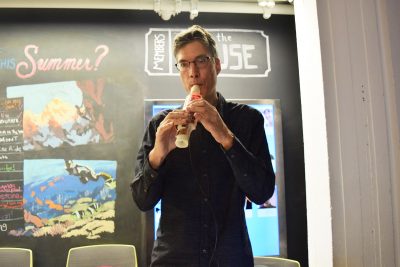
While many have drawn a defined line between the arts and sciences, the new wave of the future seems to focus on tearing that down.
Yes, it’s the age of virtual reality goggles and 3-D printing, but it’s also a time when there’s an emphasis on sharing photos, videos and music. It’s a time when audiences will wait hours for just 10 minutes with an art exhibit. And it’s a time when 9-year-olds are learning to deejay.
As part of HUBweek’s first-ever “SMASH: Fusing Music, Art, and Technology” event, the community on Monday night welcomed to Cambridge’s Workbar four companies working with the future of technology. Surrounded by dark brick walls and splashes of color in art pieces and office plants, attendees wandered from booth to booth, gaining a taste of what this new fusion has to offer.
Mmmmaven is teaching children about music production and giving them deejaying experience. eCorder is introducing a 3-D-printed electronic recorder. PeekSeeq is working on an easy-to-use app that allows people to mix sounds and create songs. And Desolus is building a new video game using virtual reality goggles.
“We really appreciate that they’re doing new things,” said Brendan Ryan, the executive director of HUBweek. “They’re creating communities. They’re bringing musicians and scientists and technologists together. So we wanted to give them some support, shine a light on it.”
With this goal in mind, Ryan decided that Workbar was the perfect place to celebrate the collaboration of different worlds. Workbar is a shared workspace with locations in Cambridge, Boston, Somerville and more, focused on providing “the professionalism of a corporate office, the flexibility of a gym, and the comfort of a cafe,” according to their website. They welcome all careers, from developers to accountants to lawyers, said Emily Smith, the events coordinator at Workbar.
“We are always trying to be involved with the community,” Smith said. “It’s a great way for people to get to know each other.”
After all, it is “a festival for the future,” as HUBweek’s 2016 slogan reads. With all the new technology and science that continues to be introduced, developers and creative professionals are just pushing the boundaries.
But it’s not always just about the new products. Whitney Bernstein, an innovation architect at IdeaScale in Berkeley, California who attended the event, said she believes HUBweek a human interest movement.
“It’s all about empowering the people to be creative and share their ideas,” Bernstein said. “People want to be consulted. People want to be included. So putting it in people’s hands, they get to participate in creating the world around us.”
As more people get involved, the separation between music, arts and science is fading away, little by little, she said.
“People think that scientists think one way and artists think another,” Bernstein said. “But they don’t often recognize that they’re all people who are curious and experimenting and trying to understand the world through different techniques … They’re not really as different as you would think.”
Ryan agrees that the barriers aren’t as significant anymore, which he said is exactly what HUBweek’s presentations are attempting to do.
“All those traditional groupings don’t really capture our audience — it’s mindset,” Ryan said. “It’s people who are engaged or want to be engaged.”
For those creative thinkers, factors like age and education are starting to matter less and less. Mmmmaven, which is Cambridge-based, has built a curriculum around teaching about digital and electronic music production with Ableton Live 9, a type of advanced software for production, creation and performance. And they’ve opened up the world to elementary school kids. Mmmmaven’s Beat Academy, a weeklong music technology day camp, is catered to kids ages 9 to 12.
“It seems that the longer we wait, the younger kids get who can use this stuff,” said David Day, executive director of Mmmmaven. “Skrillex said that in five years, all music would be made by 5-year-olds. That’s the future.”
And it’s not just age. The future is moving forward without barriers of background too.
Alex Stokes, a programmer and co-founder at Boston-based PeekSeeq, explained that the company’s new application is targeting both professionals and unexperienced individuals. Their emphasis is on speed, he said, but they’re also striving to make it easy for everyone to use. By introducing a collaborative aspect, PeekSeeq can connect people globally to arrange songs.
Startups like PeekSeeq and Mmmmaven are opening up the technological world to those who may have been shut out before. These individuals are leading the charge into unfamiliar territory, but by pulling new people into the movement, they’ve been able to advance in all sorts of innovation.
“That’s our goal,” Ryan said. “That’s what we’re trying to do — make it so that it’s not based on who you know or where you went to school. If you’re interested and you have that curiosity, then HUBweek’s for you.”



















































































































